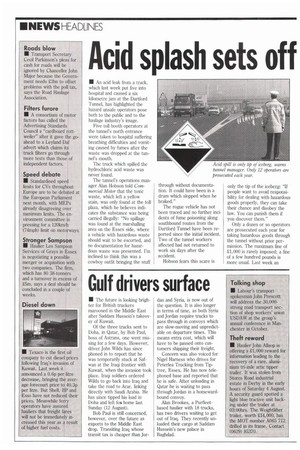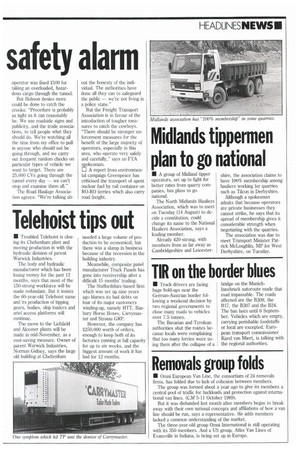Acid splash sets off safety alarm
Page 6

Page 7

If you've noticed an error in this article please click here to report it so we can fix it.
• An acid leak from a truck, which last week put five into hospital and caused a six kilometre jam at the Dartford Tunnel, has highlighted the hazard unsafe operators pose both to the public and to the haulage industry's image.
Five toll booth operators at the tunnel's north entrance were taken to hospital suffering breathing difficulties and vomiting caused by fumes after the waste was dropped at the tunnel's mouth.
The truck which spilled the hydrochloric acid waste was never found.
The tunnel's operations manager Alan Hobson told Commercial Motor that the toxic waste, which left a yellow stain, was only found at the toll plaza, which he believes indicates the substance was being carried illegally: "No spillage was found at the marshalling area on the Essex side, where a vehicle with hazardous waste should wait to be escorted, and no documentation for hazardous waste was presented. I'm inclined to think this was a cowboy outfit bringing the stuff
through without documentation. It could have been in a drum which slopped when he braked."
The rogue vehicle has not been traced and no further incidents of fume poisoning along southbound routes from the Dartford Tunnel have been reported since the initial incident. Two of the tunnel workers affected had not returned to work six days after the accident.
Hobson fears this scare is only the tip of the iceberg: "If people want to avoid responsibility for dealing with hazardous goods properly, they can take their chance and disobey the law. You can punish them if you discover them."
Only a dozen or so operators are prosecuted each year for taking hazardous goods through the tunnel without prior permission. The maximum fine of 2,000 is rarely imposed; a fine of a few hundred pounds is more usual. Last week an operator was fined 1100 for taking an overloaded, hazardous cargo through the tunnel.
But Hobson denies more could be done to catch the crooks: "Procedure is probably as tight as it can reasonably be. We use roadside signs and publicity, and the trade associations, to tell people what they should do. We're watching all the time from my office to pull in anyone who should not be going through, and we carry out frequent random checks on particular types of vehicle we want to target. There are 25,000 CVs going through the tunnel every day — we can't stop and examine them all."
The Road Haulage Association agrees: "We're talking ab out the honesty of the individual. The authorities have done all they can to safeguard the public — we're not living in a police state."
But the Freight Transport Association is in favour of the introduction of tougher measures to catch the cowboys. "There should be stronger enforcement measures for the benefit of the large majority of operators, especially in this area, who operate very safely and carefully," says an FTA saokesman.
A report from environmental campaign Greenpeace has criticised the transport of spent nuclear fuel by rail container on RO-RO ferries which also carry road freight.




















































































